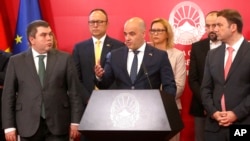North Macedonia has approved a French proposal that opens the way for negotiations to join the European Union and overcome Bulgarian objections.
There were 68 votes in favor of the proposal in the 120-member chamber, with the leftist coalition, which has 61 seats, getting the backing of small ethnic Albanian parties. Opposition lawmakers left the chamber in protest, abstaining from the vote.
Protesters gathered again outside Parliament, as they have done every day for 10 days, but the protest ended peacefully.
Under the proposal, announced by French President Emmanuel Macron last month, North Macedonia would commit to changing its constitution to recognize a Bulgarian minority, protect minority rights and banish hate speech, as Bulgaria, an EU member since 2007, has demanded.
The deal would also unblock the start of negotiations for neighboring Albania, another EU hopeful.
Macron had stressed that the proposal doesn’t question the official existence of a Macedonian language, but he had noted that, like all deals, it “rests on compromises and on a balance.”
But revising the constitution may prove too high a hurdle, since that requires a two-thirds majority, or 80 votes. The main opposition party, the center-right VMRO-DPMNE, and its allies, as well as a small leftist party, with 46 seats among them, have declared they will never agree to change the constitution.
Talks start July 19
Later Saturday, after a Cabinet meeting, Prime Minister Dimitar Kovacevski announced that North Macedonia will start accession talks with EU July 19.
“With this, we conclude another objectively historical step for our country. We have a negotiating framework in which the Macedonian language and identity are protected,” he said.
The country’s ruling coalition has backed the proposal as a reasonable compromise that doesn’t endanger national interests or identity, while the opposition has denounced it a national betrayal that caves into Bulgaria’s questioning North Macedonia’s history, language, identity, culture and heritage.
The French proposal has also roiled Bulgaria, where Prime Minister Kiril Petkov has accepted it. His centrist government was toppled in a no-confidence vote June 22 when allies described Petkov’s willingness to lift the veto of North Macedonia into the EU as a “national betrayal.”
Deal welcomed
EU and U.S. leaders welcomed North Macedonia’s decision to back the deal.
Charles Michel, president of the European Council, called the parliament’s vote “a crucial step for North Macedonia and the EU. Our future is together, and we welcome you with open arms.”
U.S. Secretary of State Antony Blinken said, “this decision comes at a critical moment for North Macedonia, the Western Balkans, and Europe.”
“A European Union that includes all of the Western Balkans, including Albania and North Macedonia, will be stronger and more prosperous. Now is the time to build momentum,” Blinken said in a statement.
Albanian Prime Minister Edi Rama also hailed North Macedonian parliament’s decision, which also opens the way for EU talks for his country too.
“This is not the end of the road but only the beginning of a new part of the road we want Albania to be in,” he said.


